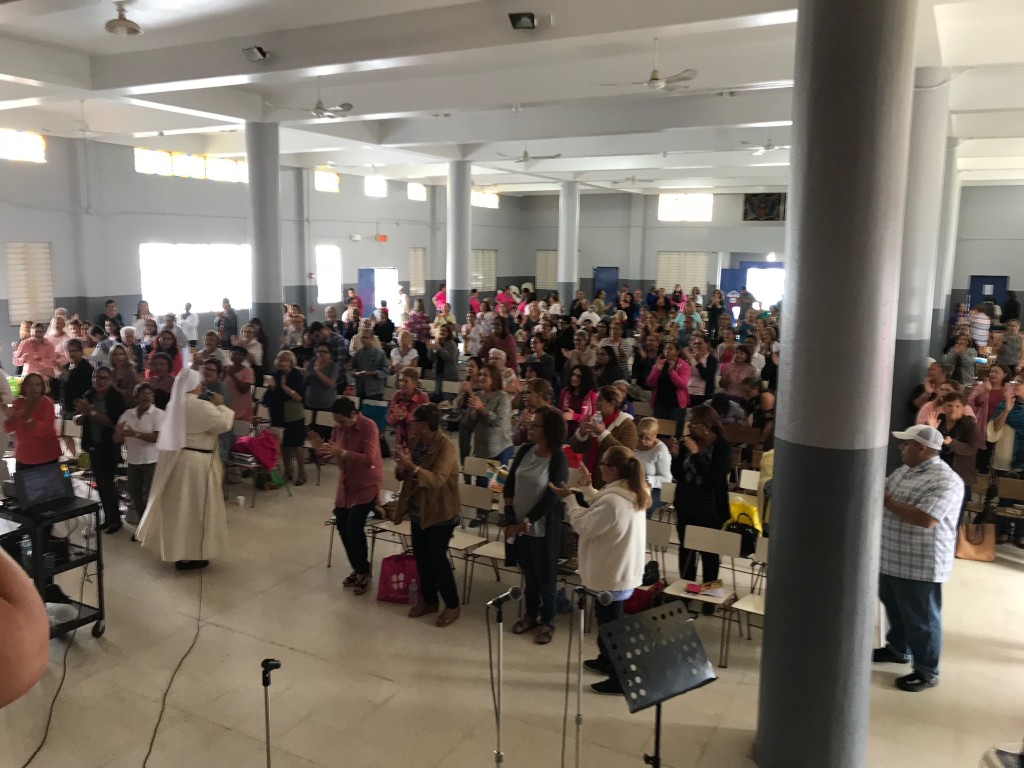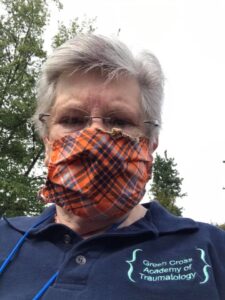
Eugene, Oregon
Wildfire Deployment Update
Dr. Mary Schoenfeldt
I am in Eugene Oregon tonight...on a Green Cross deployment supporting those skilled and tenderhearted people who rescue animals following a disaster. Some are professional and many are volunteers...and they for the joy of getting a tail wag, a slobbery kiss or a loud purr.
BUT.. not all stories have a happy ending and often these tender hearted folks are finding animals that didn’t make it out, or they are seeing horrific sights as they keep looking for a fur baby that can be reunited with their family. The work they do takes an incredible emotional toll and that is where our Green Cross team can help.
GC did this same type of deployment in New Orleans following Katrina. I can tell you that the rescuers would sometimes be huddled in bathrooms crying about what they experienced that day - declaring they could not go back out there. Our specialized support kept the number of animal rescuers up.
We also did suicide and crisis intervention on several individuals that were likely to endanger themselves, their teammates and the animals being rescued. Our crisis intervention helped reduce stress and moderate emotions for the well being and professionalism of the rescuers.
Additionally, the rescuers are often interacting with animal owners who are looking for their animals. As rescuers are not equipped to provide emotional support to animal owners, Green Cross took that pressure off the rescuers by supporting the pet owner.
We will do the same thing here in Oregon following this devastating wildfire.
Please donate what you can (link below) so that these skilled and tenderhearted animal rescuers can manage the emotional toll of searching. Please share with your friends and family as well.
If your fur baby was missing, what would it be worth to you to have people willing and able to keep searching? Would it be $20? $200? More?
It makes all the difference.
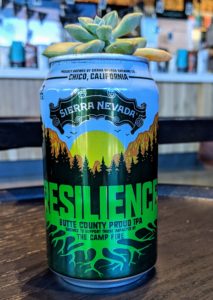
Paradise, California
Lost and Found
Mary McNaughton-Cassill
Loss comes in many forms. 86 people lost their lives in and around Paradise, California when a wall of fire swept through the town and destroyed
18,804 structures. The initial missing person’s list exceeded over 1,200 people and
an untold number of animals lost their way home. Even when people are located
they talk about how disorienting it is to see your name on a missing persons list.
Fortunately great loss also elicits great generosity.
We have been working all week in a Disaster Response Center being run out of an
empty Sears Building in Chico. The California Office of Emergency Services is
providing a one-stop center for fire survivors in coordination with FEMA, the Red
Cross, United Way, Environmental Health, and Government Groups including HUD,
the IRS, and the DMV. Although the employees of these groups are here to help
people who have lost everything, they are making significant sacrifices themselves.
Some of the FEMA workers have been here for 10 weeks, living in hotels an hour
and a half away in Sacramento, riding a bus to and from work, and staying in touch
with their own families around the country through social media. The people
staffing the DMV are all from the town of Paradise, where their own office, and many
of their homes burned down. The coordinator of the Environmental Services team
has been living in a hotel, and cooking on his George Foreman Grille, but he has a
smile and a helping hand for everybody.
While working with traumatized people can be very satisfying, it can also result in
vicarious stress and compassion fatigue. As mental health professionals, we are
trained to recognize this risk, in ourselves and others, so we consider it part of our
mission to help others who may be finding themselves sad, irritable, or tired of
listening to others people’s stories. Acknowledging their efforts, listening to their
stories, and even bringing them a bottle of water or a snack makes a difference. It is
hard to empathize with others when you are stressed yourself, but in the end, we
really are all in this together.
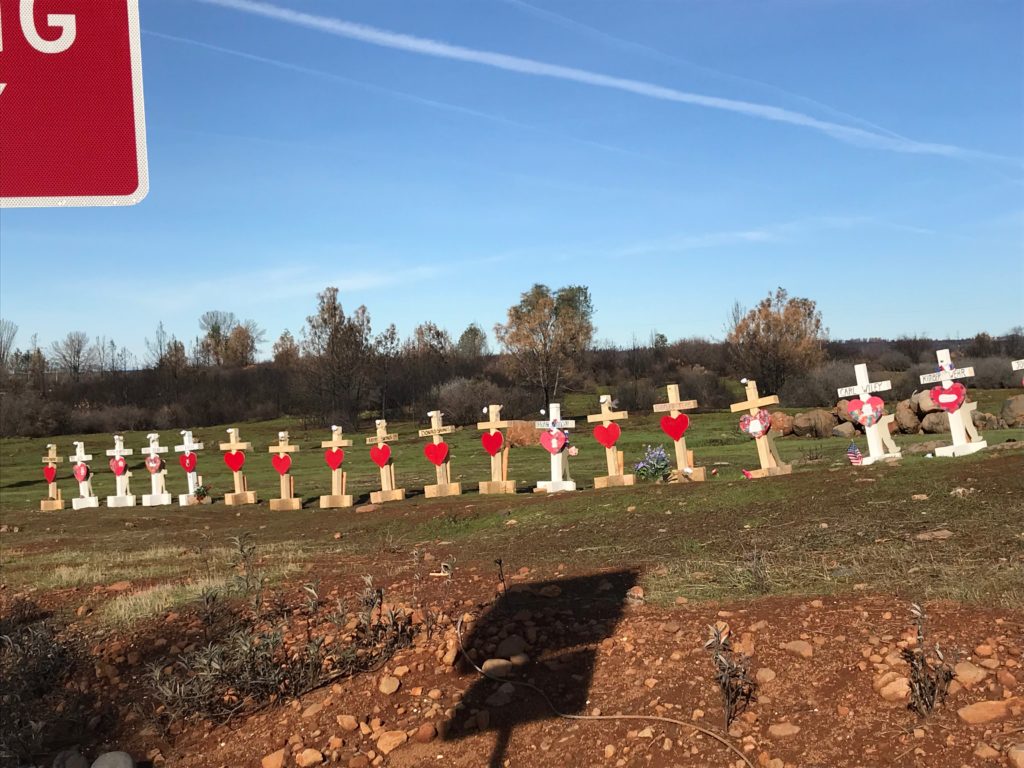
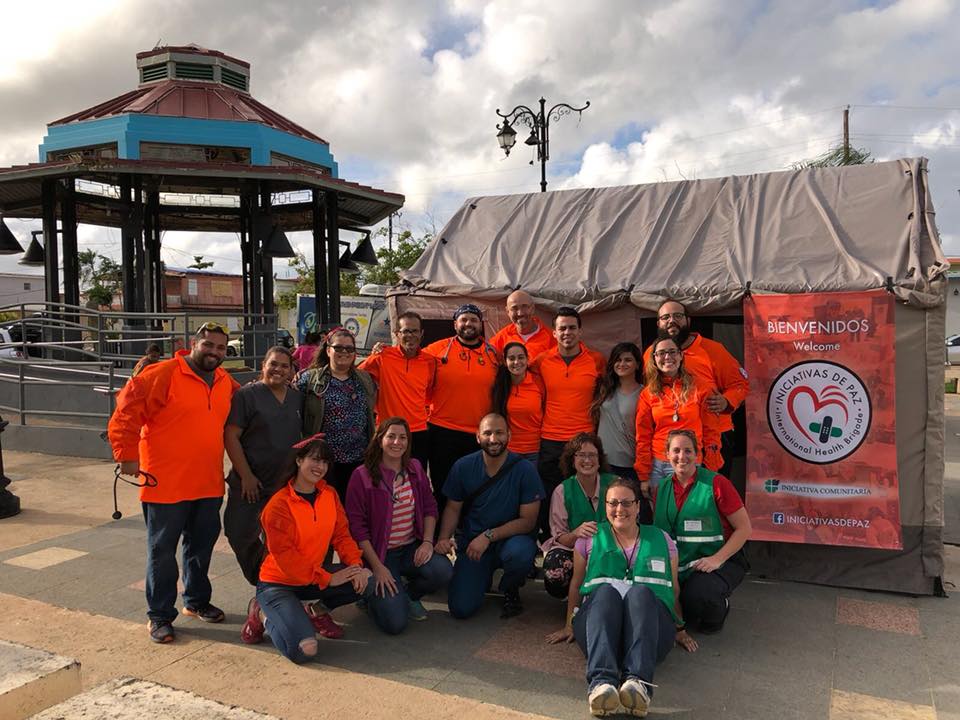
Green Cross with the Iniciativas De Paz Medical Team in Tao Baja by Mary McNaughton
"One of my favorite movies is Love Actually. While I enjoy the intertwined love stories, I find the scenes of real people photographed at Heathrow Airport to be the most moving part of the film. Whether we are coming or going, leaving is hard. There is an uncertainty that comes with travel, and a sadness that comes with leaving people we care about. Traveling with a disaster mental health team tends to bring all of this into focus. Eight days ago the members of Team 3 met for the first time in person, in the San Juan Airport. We have since spent 12-14 hour days driving around an unfamiliar city, talking to people about some of the most personal and stressful events in their lives, while living in a small uncomfortable Air B&B (think variable hot water and air conditioning, mosquitos and bunk beds).
As I have found on other deployments, the intensity of the situation breaks down barriers and leaves the team feeling connected in ways that would normally take months or years. Spending time with people who care deeply about those around them and are trained to talk about compassion fatigue, tends to lead to meaningful conversations about our own responses to the trauma we are witnessing. We also wonder how some of the stories we have heard will turn out. Will the young mother who had a baby just after the storm get to go back to school? Will the members of the medical brigade be able to keep up their work?, will we be able to come back to help them again in the future? There is no way to know the answers to those questions right now, but what we do know is that it is human bonds that help people recover, and make volunteering so rewarding. We also know that we made enough of a difference that one of the people we met asked only partly in jest “do we have to have another hurricane to bring Green Cross back to Puerto Rico?” We hope not, but if another storm hits we also know we will volunteer to go."
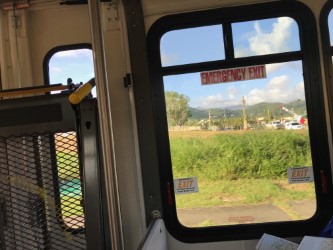
This picture was taken from the medical van on the way back from Yabacoa.
Puerto Rico Deployment Update Survivors by Mary McNaughton-Cassill
Who among us hasn’t daydreamed about spending a day in a hammock on a tropical island? But that dream rarely extends to riding out a category 4 storm with winds over 150 miles an hour, rain, and extensive flooding. More than one resident of Puerto Rico told us that the only reason they survived was that their house was made of cement, and that even then it shuttered and shook during the storm. In Yabacoa people told us that the mountains behind their public housing project had gone from green to gray and brown, and nothing was recognizable. In Toa Baja the river flooded the town and forced many people to live in the second story of their home.
Perhaps the people who were most prepared to deal with the aftermath of the storm were the older residents who had grown up without modern amenities, and lived through other storms. One elderly woman told us she just took a sleeping pill the night of the storm, and got up in the morning and set up her barbecue on the porch because no storm was going to make her go hungry. Surprisingly, other people told us that the storm did have some positive effects. A number of people said that they were happy to see children playing outside because they couldn’t watch television or play on their phones and computers. Others commented that they had met neighbors they never knew, and taken pride in their ability to help each other. Still others said that the storm forced them to reassess their priorities. In fact one of the most moving quotes we heard, loosely translated said that after the storm stripped the leaves off the trees it was easier to see the people around you. If resiliency depends in part on your ability to find the silver lining in a bad situation, than the people of Puerto Rico deserve to have streets lined with silver.
Of course many Puerto Ricans had no choice. When you live on an island you can’t just pack up your car and head inland. And, if you have the resources to leave, you are often leaving people you care about behind. Since the storm still more people have left for extended stays on the mainland as they have no jobs or homes left. There has also been a steady stream of people leaving Puerto Rico to live on the US mainland. Nearly everyone had a story about missing the people they care about. Immediately after the storm it was difficult to get news of people across the island, and reliable power is still an issue. And yet, the people and the animals continue to cope, telling us repeatedly that during an emergency, you don’t have any other choice.
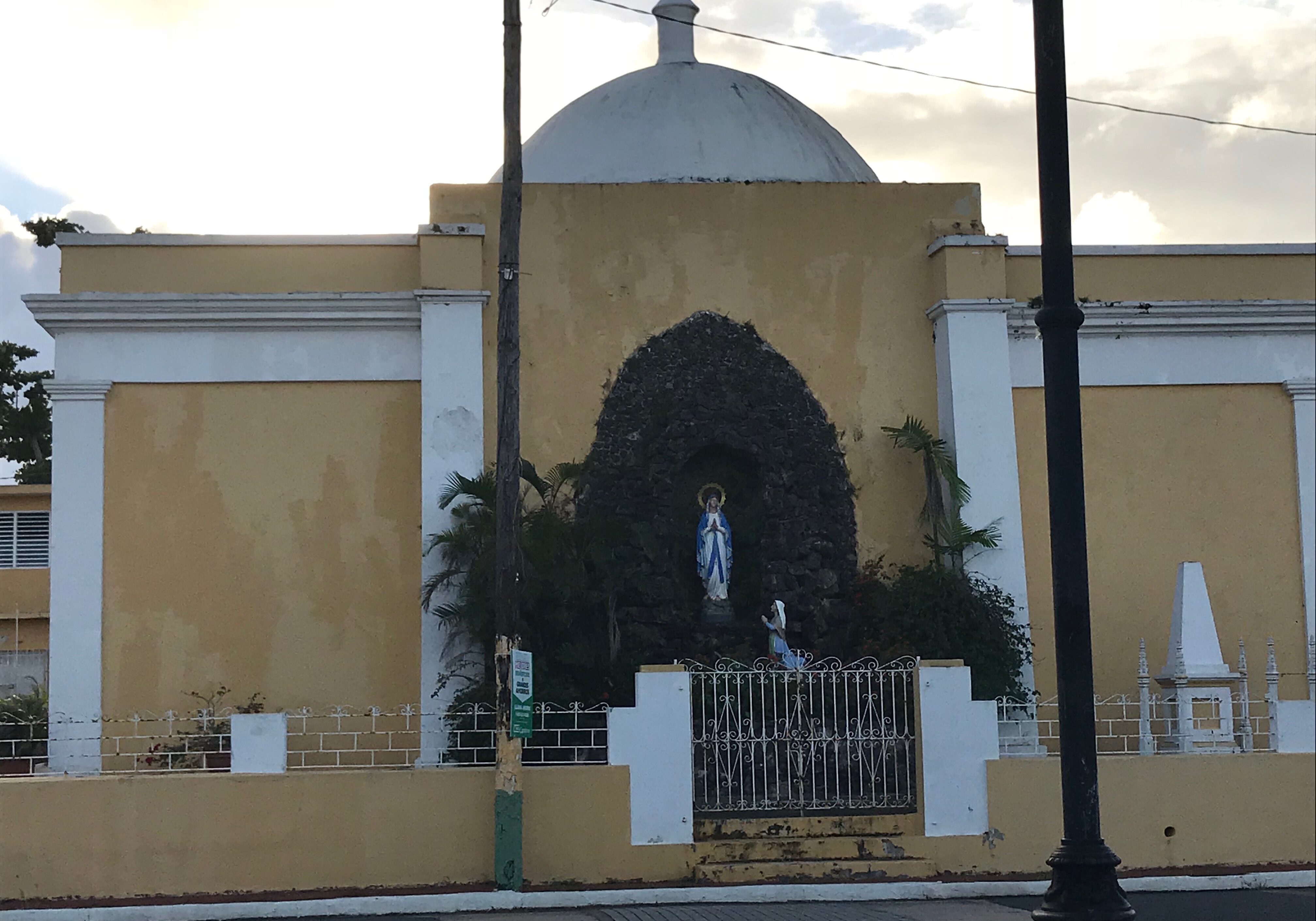
This picture were taken in the central plaza of Toa Baja, which was completely flooded by Maria and still does not have power.
Puerto Rico Deployment Update: The Three M’s by Mary McNaughton-Cassill
One of our gifts to the people of Puerto Rico is the laugh they get when we tell them that Green Cross sent a team made up of a Milena, and two Marys to help people cope with the stress of Hurricane Maria. But all jokes aside, one of the themes that has emerged in our time here is that we all long for the unconditional love and caring that we associate with mothers, whether their name is Mary or not.
This was particularly apparent as we spent the day working with a Medical Brigade team (Iniciatives de Paz) in Yabacoa, the municipality where Hurricane Maria first made landfall. This rural area was devastated by the storm and four months later the area still has no power, so people are relying on generators. While the nurses and physicians took care of people at tables set up on a basketball court, the Green Cross Team circulated among the people who were waiting. Sometimes they say they are fine and don’t need to talk, a wish we honor. But more often than not disaster survivors are desperate to tell their story, and to find new ways to think about what has happened.
As we talked to women worrying about how the storm was affecting their children, and mothers missing their grown children who lived on the mainland we realized that when disasters hit we all long for someone who will hold us, or we can hold, to make us feel better. While we don’t all have mothers who can or are able to be there for us, we can consciously provide that sense of nurturing to others. One man in Yabacoa told us that he thought it was a shame that it took a disaster to get neighbors to connect with each other, and we agreed. Maybe we could all try harder to do things that make the people around us feel valued and protected. When it comes down to it mothering is not a function of gender, or genetics, or proximity, it is a matter of showing other people you care.
Puerto Rico Deployment Update:
Strong Like the Coqui by Mary McNaughton-Cassill
The Coqui are a type of tiny tree frogs native to Puerto Rico. They are only about an inch long, but their voice makes up for their size. Some species of male Coqui are known for their distinctive cry of Co-key that reverberates through the night air. When you are trying to go to sleep it seems as though the sound must be coming from a much larger animal. Like the Coqui, the island of Puerto Rico is relatively small, but it is also populated by strong resilient people who have been working to survive. The three members of Team 3 arrived here last Saturday and have been doing stress management and compassion fatigue training at the Puerto Rico Medical Center for the past two days. We have been meeting with people from all over the hospital including personnel from Billing, Facilities Management, and Security, and Doctors, nurses, and staff from the Emergency department.
Our sessions always start out quietly, as people wonder what we could possibly have to say that would make their lives better. But as we begin talking about stress and compassion fatigue some people light up and become animated, others whisper to their neighbors, and some start crying. By the time we leave we have heard stories of trying to get ready for work when you have to take a solar shower (which cools overnight) and are washing your clothes by hand. We have heard about elderly parents who keep forgetting that you don’t have power and can’t cook, about family members who have gone to Florida, and about how frustrating it is to drive when it is hard to get gas, and the streetlights aren’t working. We have talked to people who still don’t have power, 4 months after the hurricane landed.
It is going to be a while Puerto Rico returns to a new normal, and some of the scars won’t fade. People are already talking about dreading hurricane season. But the people we are talking to, like those in Rockport ad Houston, rose to the occasion to help each other, and continue to show ingeniousness and resilience. Like the Coqui, they have a voice, and know what they want to say, we just need to stop and listen. While driving the other night we saw a hand-lettered sign on a poster board hanging from power pole near a freeway entrance. It read “Puerto Rico we love you. We must go forward like the Coqui.” We are trying to help them say that even louder.
We gave a talk on stress and coping to 250 catechism teachers at a Parochial School in the mountain town of Cayey. The conference was held in their auditorium with a microphone and lights powered by a generator. However, their voices were clear and strong as they sang and danced to a song accompanied only by clapping.
Update: San Juan, January 25th, 2018
Deployment to Puerto Rico Team 3, Led by Mary McNaughton-Cassill
"Puerto Rico is an Island of contrasts. Our flight from Dallas was filled with an eclectic mixture of residents returning home, tourists looking for the sun, and people like us going to work or volunteer. While some were headed to luxury resorts, others were going to homes that still lack power, water, roofs, and the other accouterments of modern life. On Sunday afternoon our schedule wasn’t booked, so we spent some time at a festival in old San Juan. While walking around we wondered how many of the people who were dancing in the streets, laughing with their friends, and enjoying the food, drink, and craft booths were actually seeking a few hours of normalcy in the midst of their disrupted lives.
The divide is even apparent in our Air B&B. The right half of the house has family pictures on the wall, and knickknacks on every surface. However, the air conditioning is not working, and despite air fresheners plugged into every room it is apparent that the back of the house sustained significant water damage during the hurricane. The bedrooms in the left half of the house have air, but the bathroom has no hot water.
Over the next few days we will be doing training in stress management for security officers and facilities managers at a large public hospital, traveling into the mountains with a medical relief team, and teaching the members of a church congregation about compassion fatigue. We know we can’t fix the problems Maria created, but hope we are able to help people realize that to effectively repair the surface of their lives they also have to find ways to deal with the underlying psychological damage they have sustained. We think Green Cross can help with that process."
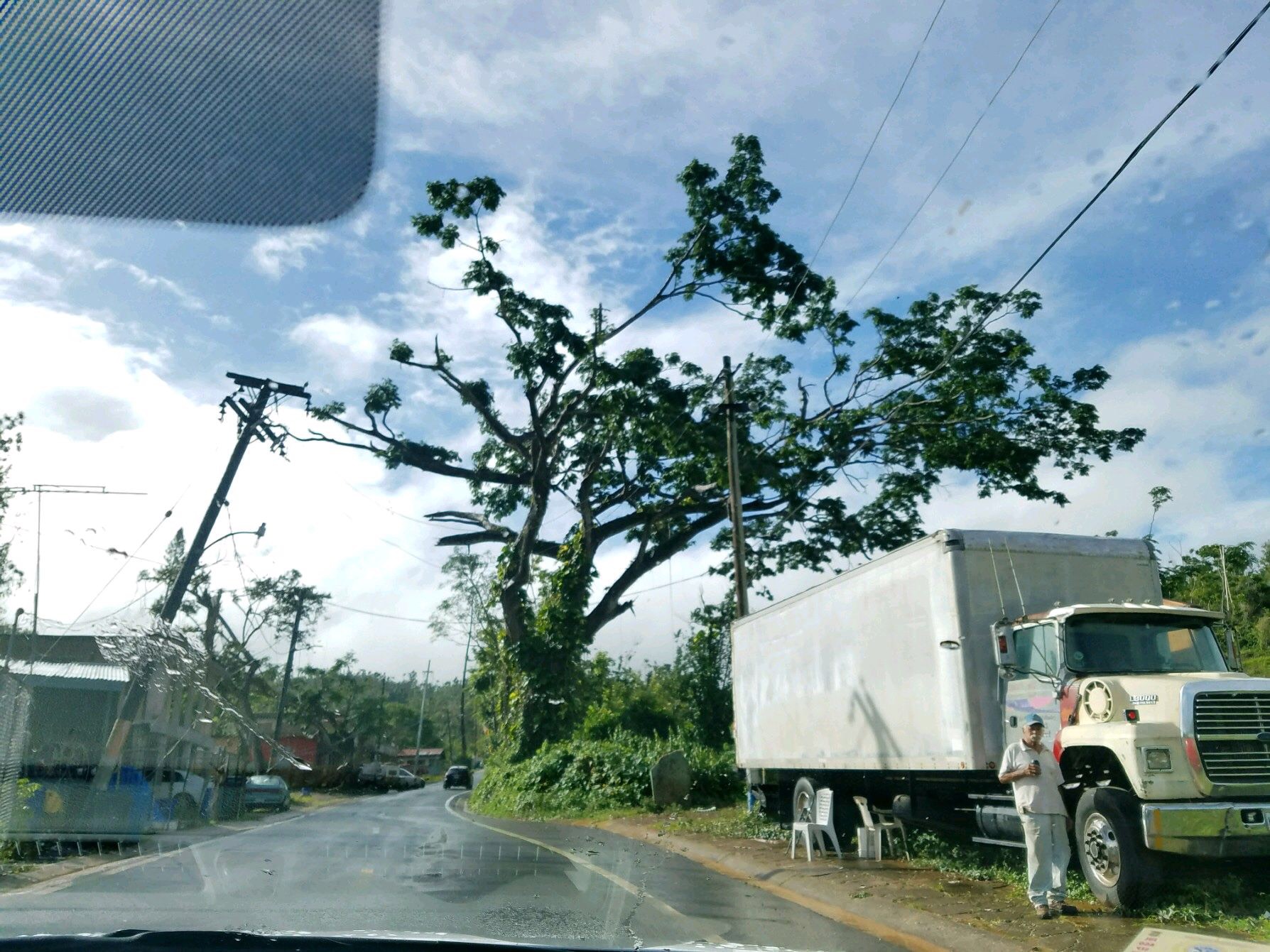
![7AF20335-6696-4835-B726-468B8E2D5E66[1] 7AF20335-6696-4835-B726-468B8E2D5E66[1]](https://greencross.org/wp-content/uploads/2017/09/7AF20335-6696-4835-B726-468B8E2D5E661-768x1024.jpg)
Update: October 25th, 2017
Dominica Deployment, Led by Lemuel Williams, following Hurricane Maria
Our teams from Trinidad have done an incredible job of responding to Hurricane survivors by running group sessions and visits with schools and disabled survivors, shelters, churches, and other relief organizations involved.
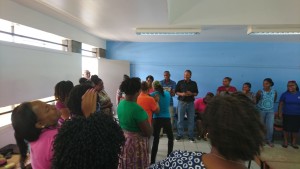
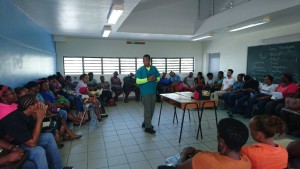
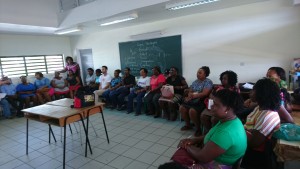
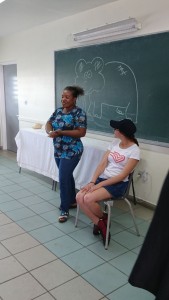
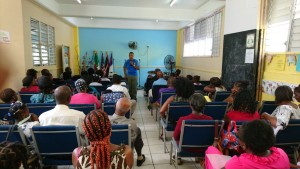
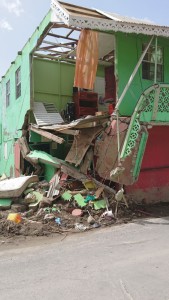
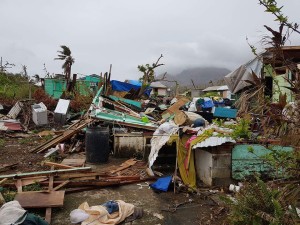
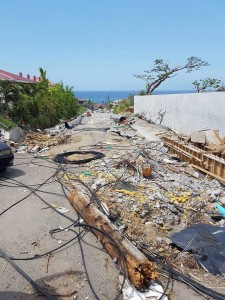
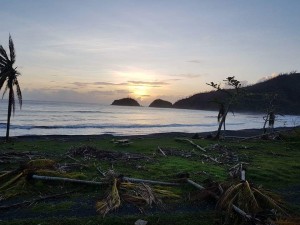
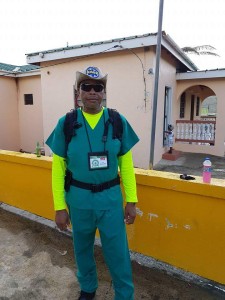
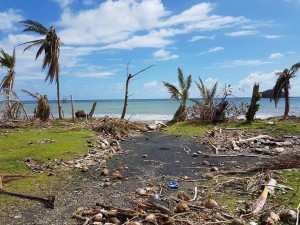
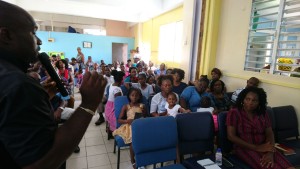
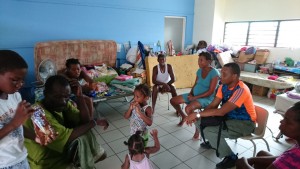
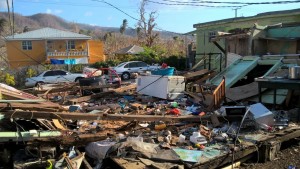
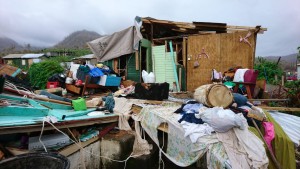
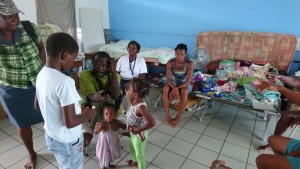
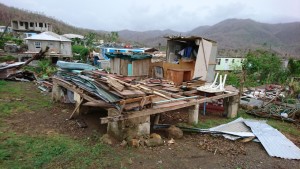
Shared by our first Rockport Team Member, Dr. Mary Schoenfeldt,
"Seven Lessons Learned in Hurricane Harvey Donation Management"
Update: September 24th, Dr. Lorrie Slater
STRENGTH AFTER THE STORM – TEXAS: POST HURRICANE HARVEY
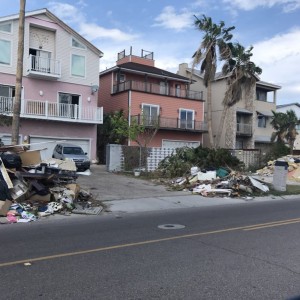
The amount of debris and devastation in Rockport, TX and Port Aransas, TX is overwhelming but the people who are here are truly amazing. Today we spoke with government officials who are trying to offer help and logistics for all the donations, visiting volunteers, and local people who are affected by Hurricane Harvey. We met with people who came from Louisiana offering food to those in need. We spoke with grateful, hungry people who were glad to have a good meal and a shady place to rest. We went to the tent city where displaced people are living in tents because they have nowhere else to go. We took the ferry to Port Aransas and spoke with locals and volunteers who were thankful for the ability to offer a hand and the generosity of strangers.
In each place we heard stories of fear and survival, loss and hope, of loneliness and community. I am humbled by the privilege to sit or stand and receive their stories, to spend just a moment and be invited into the privacy of their pain. I am also in humbled by their fierce determination and strength. Dr. Snyder and I spoke with a government official who was working at the distribution center today. She and her family had moved to Port Aransas just two weeks before Harvey hit and lost her home along with most of the contents. With tears in her eyes she shared of the struggle to remain strong for her family and community. This is why we’re here! We came for people like this, who need a listening ear and a safe place to rest their burdens. I am thankful for the privilege to hear her story and give her the opportunity to rest for a moment. The phrase that I have heard the most in my time here is, ‘God is Good’. These Texans continue to see His goodness in times of devastation and loss. I can learn much from them.
Update: September 24th, Dr. Bill McGee
RESILIENT TEXAS – POST HURRICANE HARVEY
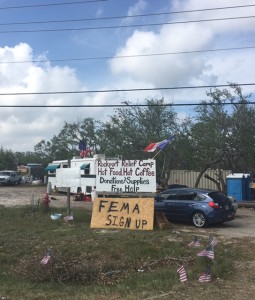
I met Jim (not his real name) in the camp set up for those who had nothing before Harvey. The hurricane was just the most recent horrible event for him. In the past five weeks his mother had died, he was evicted from his apartment, was dropped in the camp, and survived Harvey. His childhood and adolescence were successions of various physical and emotional abuse and neglect, yet he was holding on to the sometimes elusive thing we call hope. He mostly wanted someone who would listen to him. He honored me with his story.
Jim is one of those who, despite his history and succession of losses, holds onto the hope that life will get better. He holds onto the hope that he will get better.
There are others that I have been privileged to encounter and interact with. The high school coach who brought students from a rival school to hand out food and drinks because they wanted to do something that made a difference for those who lost in the hurricane. The restaurant owner who gave out thousands of good Texas barbecue dinners to his neighbors at no cost, and who continues to provide good, free dinners to first responders. The couple that stopped us at the traffic intersection to ask where they could volunteer; and on and on and on….
I am here with my team to provide emotional support for victims of Harvey. What I find are people who have put their lives on hold to help others. I have to continually remind myself that my role is to be a support; to be a part of a much larger community of caring, concerned, resilient people from all over this country: from Texas, Louisiana, Oklahoma, Tennessee, Georgia, Minnesota, Wyoming, Canada, and so many other places. People who are proud to call each other friends.
Update: September 19th, Mary McNaughton-Cassill
Green Cross Team 2 has completed their f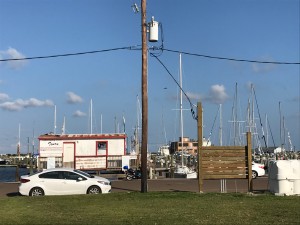 inal day together in Rockport. Some of us leave tomorrow to return to our daily routines, and others head home on Thursday. Meanwhile a new team of 4 trauma specialists will be arriving from Georgia to take up the baton. But, just as Rockport has been changed by Hurricane Harvey we have been changed by our time here. We have been reminded that despite all the bad things we see on the news the world is full of kind and caring people who want to help each other. We have also noticed that no matter how much people have lost they still want to be able to help others, and to laugh. That’s why we couldn’t quit laughing when someone jokingly looked at our vests as we stood up in a restaurant and quipped “Green Cross, what are you, Red Cross for plants? We all hope that the next time we come back to Rockport we won’t be wearing green vests, we will be here to enjoy this beautiful town.
inal day together in Rockport. Some of us leave tomorrow to return to our daily routines, and others head home on Thursday. Meanwhile a new team of 4 trauma specialists will be arriving from Georgia to take up the baton. But, just as Rockport has been changed by Hurricane Harvey we have been changed by our time here. We have been reminded that despite all the bad things we see on the news the world is full of kind and caring people who want to help each other. We have also noticed that no matter how much people have lost they still want to be able to help others, and to laugh. That’s why we couldn’t quit laughing when someone jokingly looked at our vests as we stood up in a restaurant and quipped “Green Cross, what are you, Red Cross for plants? We all hope that the next time we come back to Rockport we won’t be wearing green vests, we will be here to enjoy this beautiful town.
Update: September 18th, Mary McNaughton-Cassill
"THE CALM DOWN TEAM"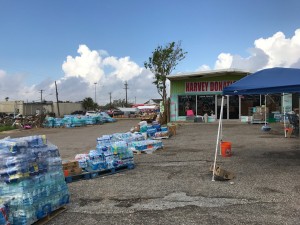
We woke this morning to light rain, and no electricity. Although it eventually came back on, it again reminded us of how tenuous the trappings of modern life really are. Without power we had to drive around town to find food and coffee, because most of the restaurants are still closed. Our team rotates out in a few days, so we know we will be slotting back into normal lives, but the residents of the Texas Gulf Coast won’t have that luxury for months or even years. And yet, we will miss the sense of purpose and camaraderie we have shared here. As members of the military know, adversity causes stress, but also forges strong bonds. We are at the point now where people in town recognize and call us over when they see us. State troopers, police officers and FEMA and TEMAT representatives ask for our help, and we have been asked to do a community presentation on how parents can help their kids cope with stress. We knew we were truly a part of the solution when someone in town suggested that we just start calling ourselves the Calm Down Team!
Update: September 17th, Mary McNaughton
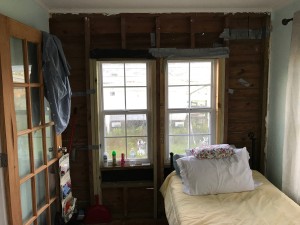 HOME SWEET HOME
HOME SWEET HOME
We trapped and killed a rat tonight, behind the refrigerator in the house where we are staying. And yet, here in Rockport we are spending our nights in relative luxury. For our headquarters, Green Cross is renting a home that is still being repaired from the storm. The roof of the carport is gone, windows have been replaced, and there are holes in the walls covered with duct tape, but it is structurally sound. The same cannot be said for many other buildings in this community. Approximately 35% of the buildings in Rockport have been totally destroyed, and far more damaged. When you are living in a nice clean, watertight, air-conditioned home watching the world through your TV it is easy to forget how quickly things can change. However, nature can certainly remind us that we are less in control than we think. The residents we have spoken to who rode out the hurricane report that they spent hours clutching their family members and wondering if they would survive. Since then they have spent most of their energy figuring out how to meet their basic needs and rebuild their lives. And they all want someone to hear their stories, to validate their feelings, and to remind them that their lives matter, and that you make the best decisions you can when your life is on the line. We felt badly about taking an animal’s life, but disasters have a way of stripping away the nonessential things in life, and making you recognize that life is fragile, and messy, and we all have to work together to do what needs to be done.
Update: September 16th, Mary McNaughton
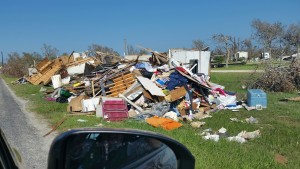 CHAOS DOESN'T HAVE TO CONTROL YOU
CHAOS DOESN'T HAVE TO CONTROL YOU
The members of our Green Cross Response Team spent the day working with people at Disaster Distribution shelters, in Rockport, Copano Bay, and Port Aransas. They all feature piles of cleaning supplies, canned and dry food, bottles of water, and people who wish they never had to hear the word Harvey again. And everywhere we went we heard people comment that “their minds weren’t working right” or they “just couldn’t think” or “they were too tired to remember what they came to do.” Of course we have all felt that way before, but the sense of being confused and disorganized is certainly exacerbated when the town you live in and love, no longer looks the way it did a month ago. It is hard to think clearly when sagging buildings and piles of debris make it clear that your world has been upended. Clearly, it will take time to restore order from the chaos, but in the meantime creating a routine, getting enough sleep, and taking breaks to relax can all help. We can’t always manage our environment, but we can choose how we think and respond to the challenges we face. The brain, like the rest of our body, takes energy to work properly, and works better when we treat it well, so don’t forget to rest you mind as well as your muscles!
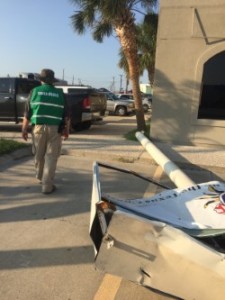
Update: September 15th, Mary McNaughton
THE VEST
It is hot, and getting hotter here in Rockport. Although the ground is still strewn with branches, sheets of metal, and water soaked furniture the leaves are starting to come out on the trees and plants are blooming again. There are signs that the town is coming back to life as well. HEB and Walmart are open, although their hours are limited and neither building came through the storm unscathed. Smaller businesses are starting to serve food again, and everywhere you go you hear the sound of saws and hammers. But many of the town’s volunteers and residents are finding it hard to see the flowers for the weeds.
There is actually a pattern to disaster recovery. In the early stages people are caught up in the struggle to survive, and encouraged by stories of sacrifice and heroism. But as reality sets in people get frustrated, by the slow pace of recovery, and how hard it is to brush your teeth when you don’t have power, water, or an intact house. That’s when having the chance to talk to someone who can help you step back, alter your perspective, and see the larger picture matters.
And, that’s where Green Cross comes in. Our green vests stand out as we spend time talking to people who are standing in line to get cleaning supplies, waiting for food, or trying to clean up their yards. While commiserating with their losses we are also able to help them realize that their sadness and frustration are normal, that establishing new routines can be very helpful, and that sleep and self-care are critical. In a town where every conversation involves a discussion of what the insurance or FEMA inspector said about the structural integrity of your residence we had to laugh when a man in Dairy Queen heard that we do Disaster Stress Management and joked “is that people stress you are talking about?”
Update: September 14th, Mary McNaughton
HARVEY'S MELTING POT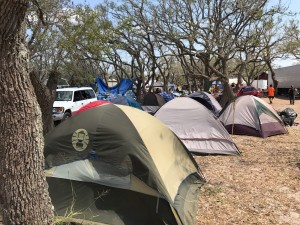
On Day 20 after Hurricane Harvey made land in Rockport Texas, the town resembles a Beehive that has been tipped upside down and shaken. The streets are lined with piles of discarded carpet, furniture, and tree branches. Even some of the seemingly indestructible palm trees were uprooted, or bent, and roofs all over town sport blue plastic tarps. In the meantime, people everywhere are searching for mementos of their lives in the rubble, and sharing stories of what it was like to ride out the storm in their home, or to return to see what was left.
In a situation like this, emotions are close to the surface. People tear up while laughing, and say they are fine when their body language indicates anything but… However there is also a tremendous sense of purpose. People are handing out bottled water on every corner, sorting truckloads of supplies, and cooking hotdogs and hamburgers for total strangers. We quickly learned to ask people if they are residents, workers or volunteers, but offered all of them bottled water, lifesaver candies, and a listening ear. As disasters proceed, people get tired, tempers fray, and recovery seems far away. Being grateful to be alive doesn’t obviate the pain of realizing that your home has blown away, and serving 1000 lunches today doesn’t mean that there won’t be hungry people tomorrow. However, the resilience and resourcefulness of Rockport aren’t going anywhere. As I stood on the edge of a Relief Center created and staffed by the property owners who themselves had just lost their business, one of the workers looked at me and said “This is the Melting Pot right here, we are all Americans.”
Update: September 13, Nathan Ray
CARRYING THE WORK FORWARD
How do Green Cross volunteers keep the work going when teams and individuals change? Our Rockport Team 2 is providing an excellent example. The four person team came into town and met with the assessment team for a briefing & orientation, before jumping straight into fieldwork together.
Since then, Team 2 has continued to work with organizations and individuals to whom they were introduced, but have also expanded their reach into the community by using their own interests and strengths to forge new relationships and create more opportunities.
Update: September 14, Dr. Mary Schoenfeldt

INTERVENTION BY ICE CREAM???? NOW THAT'S A NOVELTY
You just never know what's going to make a difference when you are providing crisis intervention and disaster stress management. We rang bells and drove slowly through the streets of a severely impacted neighborhood. Some people looked at us strangely, others came running and a few stood back till they could figure out what was going on. The neighbors here are helping and looking out for one another. When we stopped, we pulled out a cooler filled with ICE CREAM BARS!!! Now we had their full attention. We served ice cream... and listened while a 9 year old wished hurricanes weren't real, we talked to a man about pride... about how helpless it feels when you've lost everything and need to accept help from others, we helped a woman understand why her friend was standing in the middle of a collapsed condo carefully putting her cooking spices in a packing box so she felt like she had some control over something and then she herself talked about throwing up from being stressed, and we gave resources and education to the woman who had some damage to her home but lost her job because their building collapsed. And through it all... people laughed, cried and licked that melting ice cream like they did when they were children and the world felt more predictable and safe. You may not find it written in text books... but this is how you do Field Traumatology and Psychological First Aid when you are part of Green Cross Academy of Traumatology. Thank you to our supporters who donated through www.greencross.org to help buy the ice cream. This neighborhood asked us to say thank you for them! Please share to educate others and peruse our website so we can buy more ice cream!!
Update: September 14th, Nathan Ray
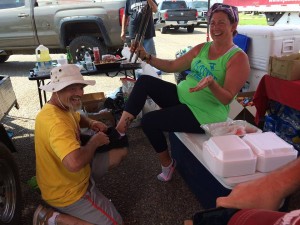
Hurricane Harvey deployment day 6 - If you tried to tell me a few months ago that I would spend my birthday deployed in South Texas doing disaster stress management... I probably would have been more prepared, lol!
Started today with a Starbucks, plus making sure we had plenty of flyers & handouts, then joined Mary Schoenfeldt & Sherry in Rockport. They had just secured housing for our relief team, which was coming into town at noon. Yesterday, we found out the housing we had lined up wouldn't work because of additional damage that hadn't been noted previously, so it was quite a scramble!
We met with the 4 Green Cross members and spent a few hours discussing our experiences, the contacts that have been made, logistics, and providing some "just in time" training. Then we hit the field. The team split to cover multiple areas & people around the city. I connected our former EMT with the Fire Department, showed him where other agencies & resources could be found around town, and we identified several churches with which he could connect.
In the evening the team came back together at the Dairy Queen to pick up ice cream treats for our community meeting in Copana Heights, the neighborhood I've talked about before. Using a big cooler loaned by the Fire Department, we took nearly 100 novelty treats with us! Residents had been watching for our arrival and we had over 20 neighbors who joined us for ice cream, stress management education, and some one-on-one interventions. My heart strings were pulled when a 9-year told me "I just wish hurricanes weren't real." We talked about how bad things sometimes happen, but that good things could come out of them.
Our initial team heads home tomorrow after we spend a little more time with the incoming team in the morning. I am really ready to go home AND I wish I could stay for another week or two. Rockport and it's residents have taken a piece of my heart.
Update: September 12th, Dr. Mary Schoenfeldt, Green Cross President
"DIGNITY AMONG THE DEBRIS"
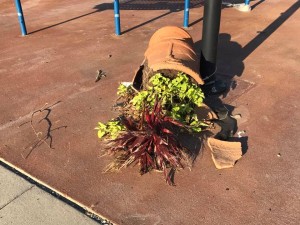
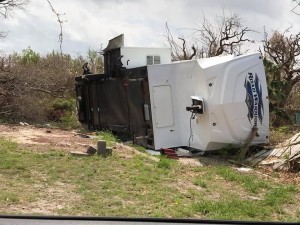
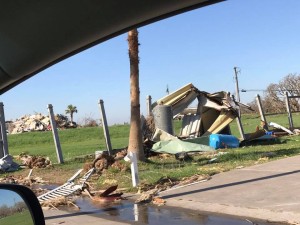
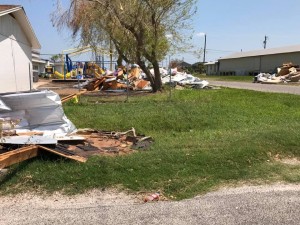
Hurricane Harvey couldn't take everything. It may have taken boats, birdfeeders, bedrooms, and beautiful homes... but not what matters most...spirit and dignity. By my estimation, the town of Rockport Texas has close to 90% of homes with damage. More than half completely destroyed. Piles and piles of debris. And amid the debris, is DIGNITY. We visited a middle class neighborhood with mostly mobile homes structures still without power and water. There we met an artist who's art studio had collapsed. She talked about trauma and recovery and described her signature piece of art... a woman figure coming out of a gnarled and twisted tree. We met a 90 year old man sitting on his porch next to a slightly off kilter 30 foot long trailer where he and his wife rode out the storm. When we talked about being afraid .. he just snorted and said "I'm a Korean War Veteran, there is nothing that can compare to that". And we spent more than an hour with Connie, known to the neighbors as "the woman on the corner who is sleeping outside on an air mattress". She has two trailers tipped over so the view from her beautifully groomed yard is the underbelly and the wheels. She has created an oasis under a small tree with an air mattress, two pink (so they would be color coordinated) blankets she got from a donation center, an ice chest with melted ice, a bed for her dog and 2 tattered lawn chairs. When we met her she had just fixed herself her evening cocktail in a beautiful tall plastic glass and was enjoying watching the birds and the evening sky. Each of these people had catches in their throat and tears in their eyes as our Green Cross Team talked to them. And each expressed gratitude for the time and conversation that had no other agenda than to talk with them and hear their stories. Our team is thankful to be here and meet these people. With each we asked if there was anything in particular we could bring them on our next visit.. to our surprise 2/3 said ICE CREAM !!! So we will find an ice chest, buy some ice, stock it with ice cream bars and go back to give the neighborhood a surprise Ice Cream Social. If your heart is as touched as ours ... PLEASE support us and them...by donating to Green Cross, and designate it to Harvey Deployment. And please share this post with your friends. We promise to buy ice cream, continue listening and help all the people of Rockport find dignity again.
Update: September 10th, Dr. Mary Schoenfeldt, Green Cross President
"HURRICANES DON'T CARE ABOUT HUNDRED DOLLAR HAIRCUTS"
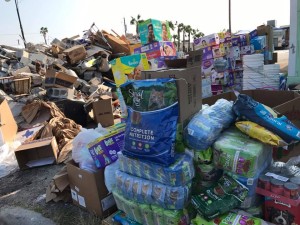
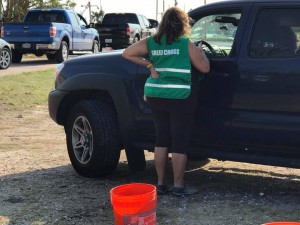
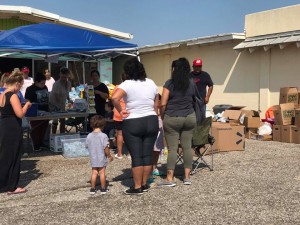
"Old pickups, battered mini vans, luxury cars, toy hauler trucks... they are all in the same line today... waiting to pick up new socks, canned food, towels, baby formula, bleach and bottled water. This disaster was a "leveler" .. literally and figuratively. Green Cross trained team is talking to people in line ... "selling" cold water. The price? A smile, a story of gratitude or thankfulness." The people are more than willing to pay!! When we hand out water and talk... what are we really doing? Psychological First Aid, Disaster Stress Management and Cognitive Reframe. We are taking them from being emotionally "crispy" to a place that will let them keep moving towards recovery. Many will return later to help someone else. Our website, www.greencross.org is the place to learn more, maybe join us and help financially support our volunteer expenses so we can keep doing what we are doing. Please donate, share with your friends and ask them to like our Facebook page."

Update: September 8th, Dr. Mary Schoenfeldt, Green Cross President
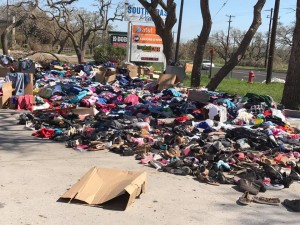
"First deployment for Harvey, certainly won't be the last. Arrived in Corpus Christi. Tomorrow we will start to organize and assess how we can help with supporting those so heavily impacted here. Have already heard the stories of ... "thank you for being here, how can I reassure my daughter we are all safe now?" And the one that goes like this... "I'm an attorney and my house was just 5 miles from the eye... I'm exhausted and we've just started the clean up, not sure when I will be able to get back to work".
I tell them they aren't alone. Green Cross volunteers can help. You can help too by sharing this post and donating to help defray expenses so Green Cross can send more teams."

Update: September 7th, Dr. Mary Schoenfeldt, Green Cross President
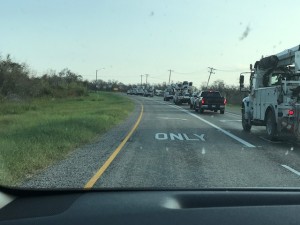
"In Rockport Texas. The eye of Harvey hit this community outside Corpus Christi. I followed a line of trucks this morning going to Rockport where there is no power, water or sanitation. The trucks were filled with heavy equipment, generators, chain saws and determined faces. When I left, I fell in line with trailers full of broken sheet rock, torn roofing materials, refrigerators that were tied shut and exhausted faces. I am glad Green Cross Academy of Traumatology is here. We need your help to take the financial pressure off those who can come and make a difference."

